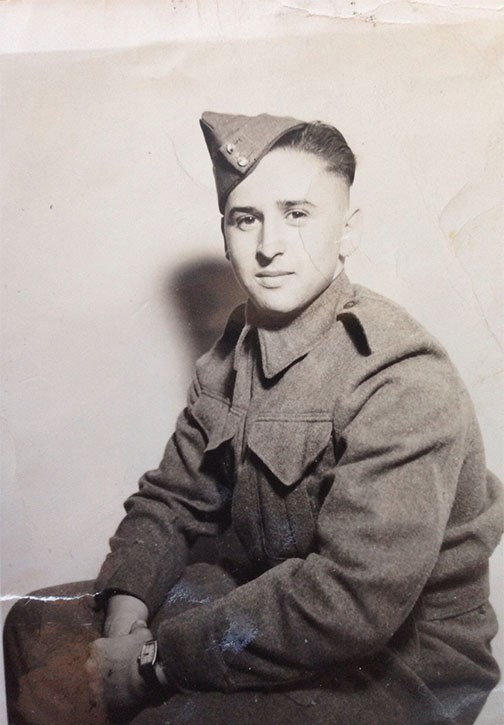 Tom Slater and Tom St. Amand
Tom Slater and Tom St. Amand
Motorists pass Berger Drive daily, unaware, perhaps, of who Berger was. The poppy on its street sign indicates only that Sarnia has recognized a veteran. The person so honoured is Max Berger, 22, a private with the Canadian Expeditionary Force who was killed in 1941 during the horrific Battle of Hong Kong.
Max's story began over a century ago. Morris and Regina Berger had immigrated to the United States from Hungary before moving to Sarnia in 1914. Five years later, Max was born in the family home at 167 Davis Street.
Morris was a busy shoemaker who worked from his home, while Regina looked after their three children: Joseph, Max, and Laura.
Max's life changed drastically when he was eleven. In July 1930, Regina, age 49, passed away from heart failure, a crushing blow to the family.
Within two years though, Morris had remarried. Max's stepmother was Pearl, a Hungarian born seamstress who had immigrated here.
Max kept himself busy. He attended nearby Wellington Street Public School and later SCITS. The entire Berger family worshipped at the Ahavas Isaac Synagogue on Davis Street, a few blocks from their house. Max was also active in the Canadian Young Judaea, a national organization for Jewish youth.
After graduating from SCITS, Berger worked as a local cab driver, as an assistant manager at a Toronto fish and chips shop, and as an electrician in St. Thomas.
Beginning in July 1940, Max also joined the Second Elgin Reserve Regiment in Sarnia; however, he wanted to serve his country, so in March 1941 he enlisted with the army.
If Max wanted action, the 5' 4” Sarnian soon found it. In October 1941, Berger was one of nearly 2,000 Canadians who left Vancouver for Hong Kong, an island off the coast of mainland China and a British Crown colony. Britain recognized the strategic importance of Hong Kong and the need to defend it from Japan. When Britain asked, Canada agreed to provide troops for Hong Kong's defence and defending the colony became the Canadian army’s first engagement of the Second World War.
En route in the Pacific, Max wrote a letter to his parents – the last time they ever heard from him. The Canadians arrived in Hong Kong on November 16, hoping to have, as the British had indicated, months to train as most were raw, unseasoned soldiers.
British intelligence had also informed them that if the Japanese did attack, they posed no real threat. The British were wrong on both counts. Less than eight hours after attacking Pearl Harbor on December 7th, Japan invaded the Hong Kong mainland. Japanese forces not only outnumbered the defenders five to one, but their 52,000 soldiers were battle-hardened and zealous. They also enjoyed the advantages of air and artillery superiority.
On December 18th, they attacked the island. Berger had spent the early part of the battle driving supplies to frontline units, but when the encroaching Japanese cut off supply routes, the role of Max’s unit changed. It became an ad hoc unit of the Royal Canadian Army Service Corps tasked with defending the vital strip of land connecting the two Allied positions.
On Friday, December 19th, Private Max Berger was killed in a fierce skirmish, six days before the overwhelmed defenders surrendered on Christmas Day. Berger, whose body was never recovered, was one of 290 Canadians who died defending Hong Kong. Many others later succumbed to their wounds; the survivors became prisoners in brutally run camps.
Max Berger is commemorated on the Sai Wan Memorial in Victoria, Hong Kong and on the Hong Kong Veterans Memorial Wall in Ottawa.
In Sarnia, Max's name is inscribed on the cenotaph and Berger Road, opened in 2008, became one of five city streets named for local fallen veterans. (623 words)
